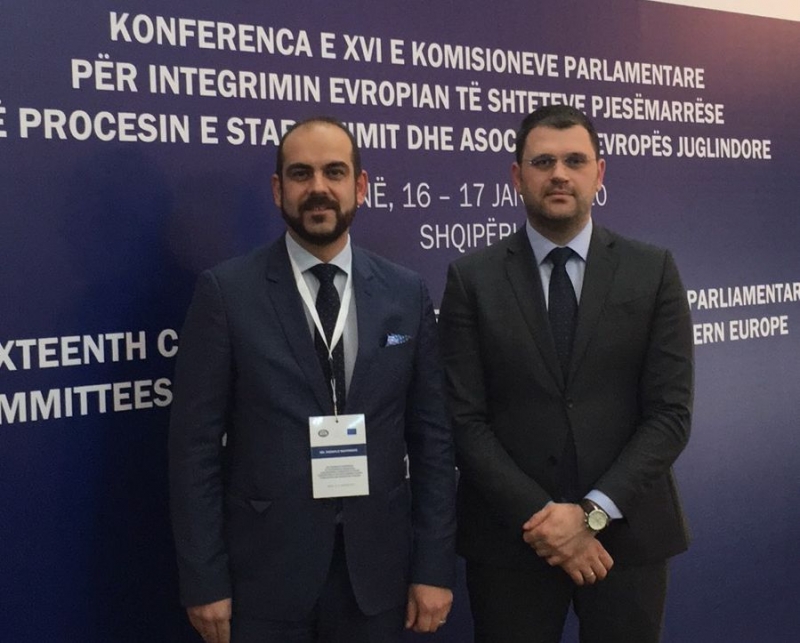The sixteenth meeting of the Conference of the Parliamentary Committees on European Integration/Affairs of the States Participating in the Stabilization and Association Process in South East Europe (COSAP), attended by delegations of Albania, Montenegro, North Macedonia, Serbia and Kosovo, was marked by a debate on the role and responsibilities of parliaments in the Berlin Process. The delegation of the Committee on European Integration of the Parliament of Montenegro consisted of Committee members Mr Momčilo Martinović and Mr Mihailo Anđušić.
In the introductory part of the meeting, the parliamentarians were addressed by the following: Mr Gramoz Ruçi, Speaker of the Parliament of the Republic of Albania, Ms Rudina Hajdari, Chairperson of the Committee on European Integration of the Albanian Parliament,Ms Majlinda Bregu, Secretary General of the Regional Cooperation Council (RCC) andMr Luigi Soreca, Head of the EU Delegation to Albania. Among the COSAP participants were Ms Belinda Balluku, Albanian Minister of Infrastructure and Energy, and Mr Zlatko Kramarić, Ambassador of the Republic of Croatia in Albania. They emphasised that the Western Balkans should be a region that develops peace, freedom and security, rationally uses resources and capital and strengthens its competitiveness. Expectations of an improved EU enlargement methodology have been expressed as well as hopes that during Croatia's presidency of the Council of the EU the accession talks with Albania and North Macedonia would be opened. It was concluded that the countries of the region must show political commitment and fulfil their obligations in the European integration process, but also that the EU must provide a clearer European perspective to the region and keep the enlargement policy high on the Union agenda.
Within the first panel, parliamentarians discussed the mobility of young people, the problem of their unemployment and demographic and migration trends in the region. They highlighted the importance of improving the quality of education and training systems, taking active measures to improve the working environment and fostering entrepreneurship, and fostering youth mobility among the countries of the region, as the main preconditions for a better life of the youth. They also emphasised the need to strengthen young people's confidence in the perspective of the region and the opportunities it offers, as well as their active involvement in major social and political processes. The regional initiative for mutual recognition of diplomas was welcomed and support was given to the work of the Regional Office for Youth Cooperation (RYCO), established under the Berlin Process.
In his address to the attendees, member of the Committee for European Integration Mr Mihailo Anđušić pointed out that young people, with their ideas and innovations, represented a strong drive for building a healthy and modern society, and that their activism could serve as a good example of democratisation and transformation of a society in this region. He emphasised that the prerequisite for the successful implementation of all policies was the legislative process preceding them, thus recognising the paramount importance and role of parliaments in this area in creating good quality of legal solutions for a favourable environment for young people.
The second panel, dedicated to the interconnectivity of the Western Balkan countries, was marked by a discussion on regional transport and energy interconnectivity projects, and measures to stimulate the free movement of people, goods and capital in the region. The parliamentarians pointed out the significance of regional economic cooperation for strengthening the competitiveness of the region, but also emphasised that the focus should be on solutions which are of good quality and sustainable rather than on quick solutions. They also highlighted the digital integration of the region as a particularly important element of connectivity, and welcomed the work on the Digital Agenda for the Western Balkans.
Member of the Committee on European Integration Mr Momčilo Martinović pointed out that regional cooperation should be based on the goals of security, stability and economic prosperity. The Berlin Process sees a special significance in the Connectivity Agenda, through which 39 priority projects have been identified so far in a coordinated manner in part of the construction of regional transport and energy infrastructure, with a total value of over EUR 3.2 billion. He reminded that the Western Balkans must also be connected through mutual support and cooperation between people, in order to mobilise the region's creative potential and strengthen its capacities, expertise and knowledge, and thus its European perspective.
At the Sixteenth COSAP, a Joint Statement was adopted, which supported the initiative for the active involvement of parliaments in the Berlin Process, which would further strengthen the mutual cooperation of parliaments in the region and their cooperation with the European Parliament and the EU member states.












